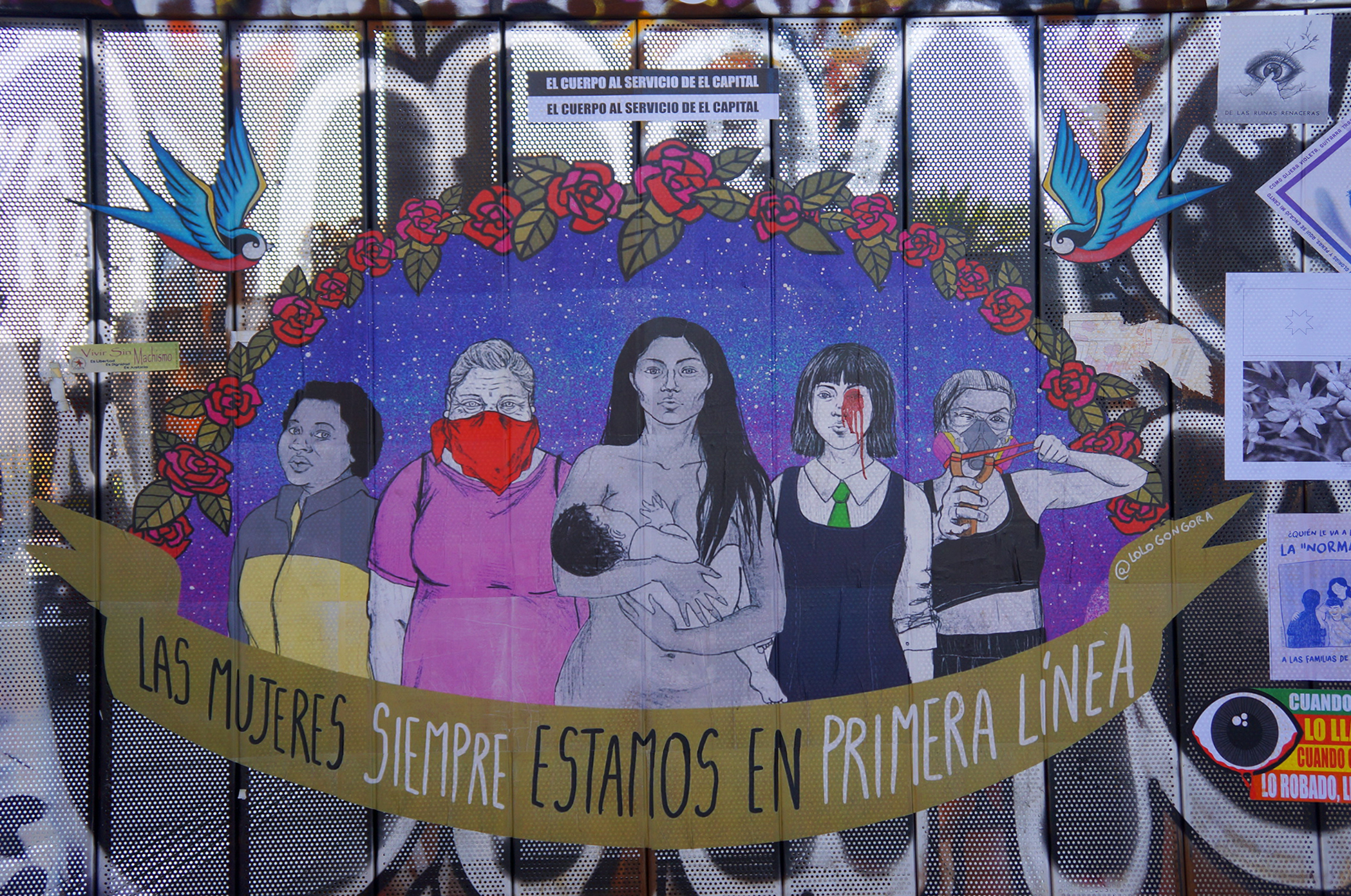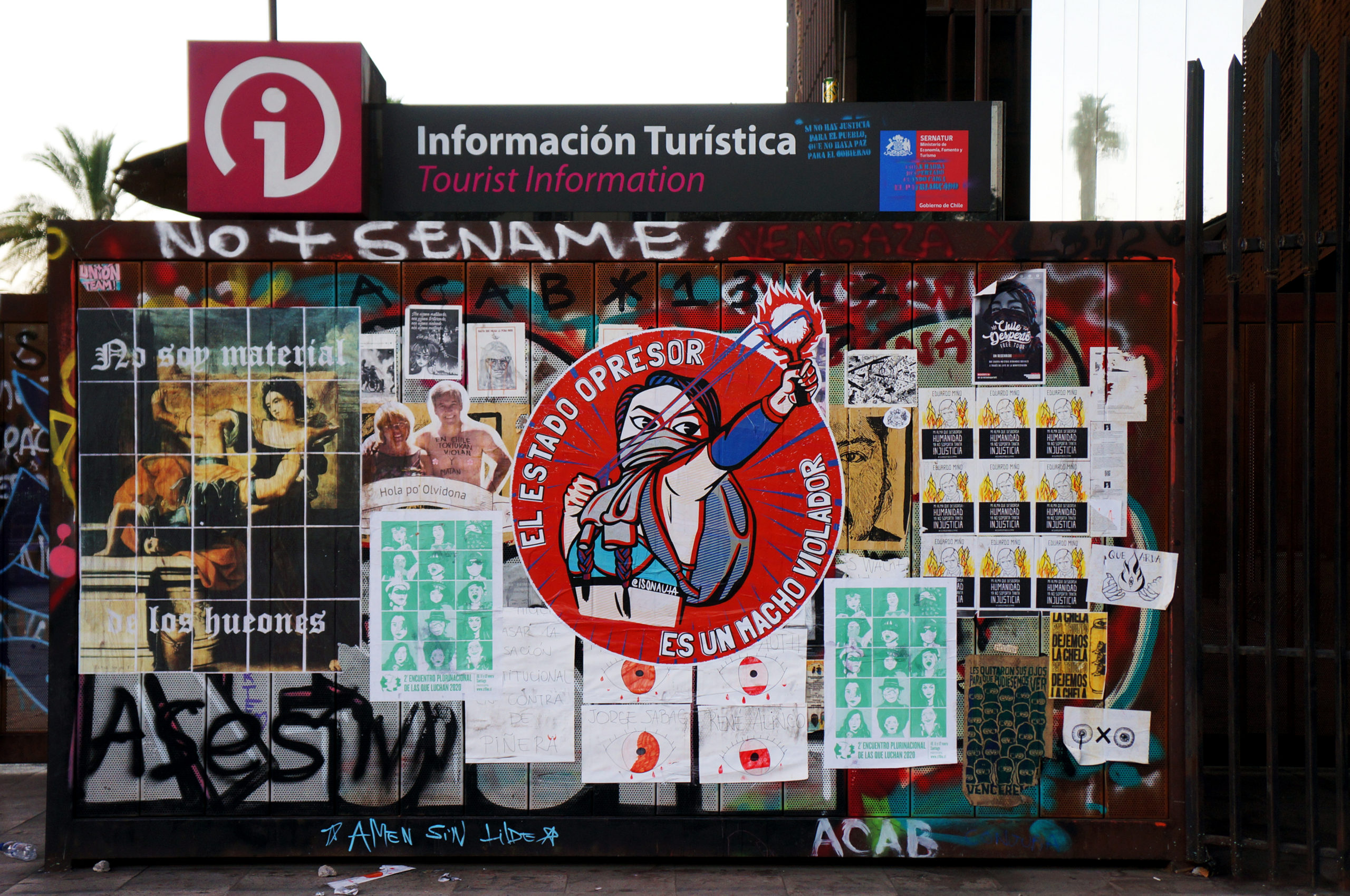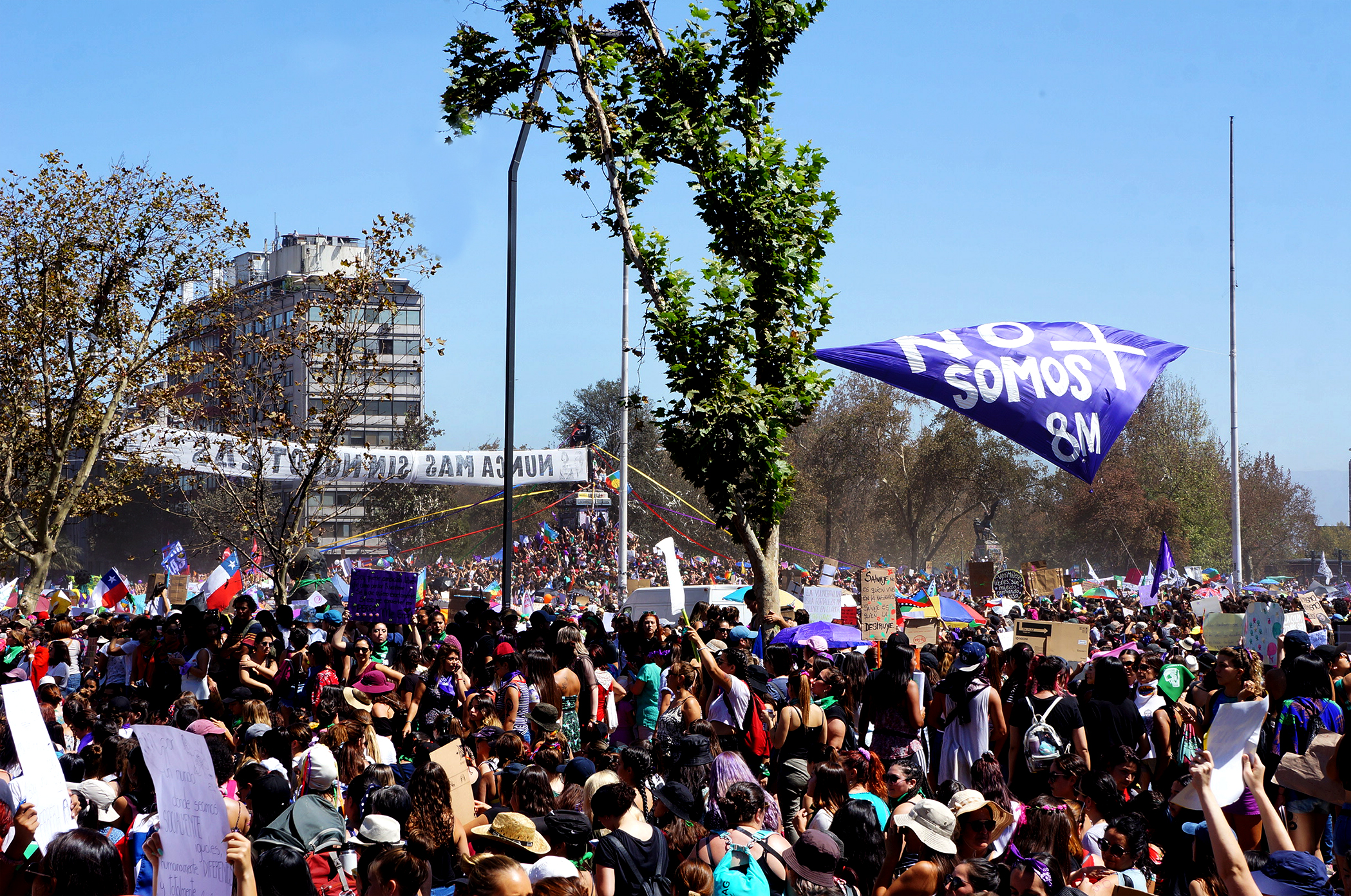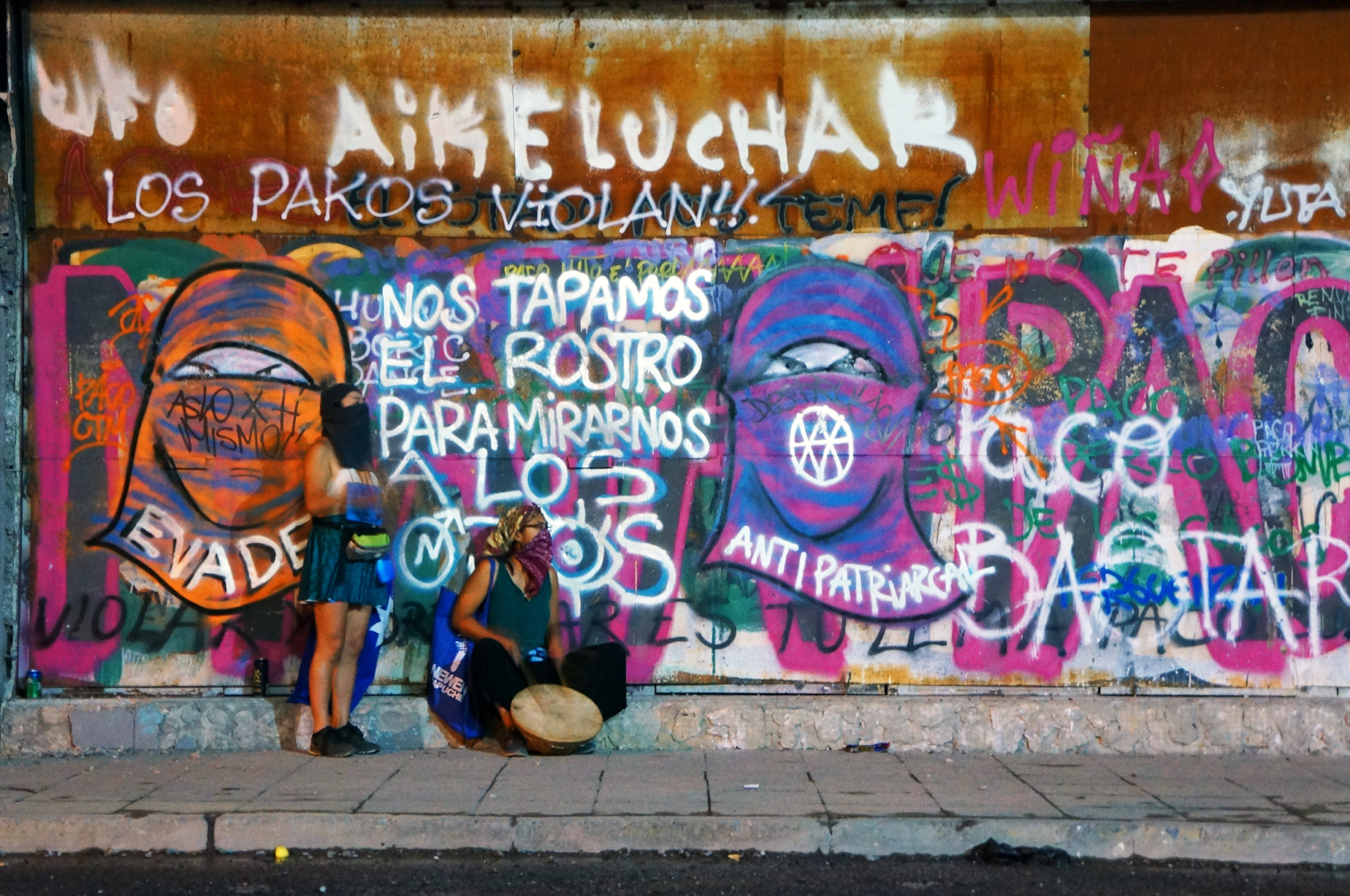The women’s movement in Chile has waged a long and diversified struggle for decades. Women were systematically oppressed and violated during the dictatorship of 1973-90, and were written out of Chile’s state when the constitution was implemented in the 1980s, as such, the women’s movement has always been politicized.
This history of mass protests and occupations strengthened the potential of women’s organizing in the 2019-2020 estadillo social (social uprising) in Chile. Different women’s protest groups and feminists movements have unified in recent years, and the now internationally famous feminist performance art that surfaced during the estadillo, Un Violador en tu Camino (A Rapist in your Path), repoliticized the issue of violence against women and unified the feminist movement.
Looking back
In 1973 a US-backed military coup overthrew socialist president Salvador Allende. It was the start of a brutal 17-year dictatorship which became what critical geographer David Harvey called “the first experiment with neoliberal state formation.” Allende had led the world’s first democratically elected socialist government, which threatened domestic business elites and international actors such as the United States.

The regime of Augusto Pinochet, backed by the US, violently repressed all social movements and opposing political organizations, dismantling all forms of community organization.
The dictatorial regime promoted a particular family order, where women were not involved in politics and were meant to play a household role. During the dictatorship those who opposed the government and were involved in leftwing circles were detained and thousands tortured.
Torture against women was predominantly sexual. In interviews, victims have described misogyny entrenched in this torment, and their torturers expressing anger that women should not get involved in political issues. There was a systematic attempt to take women out of the political sphere, and since then, the women’s movement has been central in trying to re-politicize their rights.
Early on in the Pinochet regime, a group of Chilean economists, known as the Chicago Boys, who had been studying in America under neoliberal pathbreaker Milton Friedman, returned to Chile and helped restructure the economy according to their theories. This involved the privatization of public assets, reversing nationalizations and opening up natural resources such as fisheries to private and unregulated exploitation. Social security was privatized, including healthcare, pensions and education.
Pinochet’s presidency heightened the country’s international image – Chile was the first South American nation to join the Organization for Economic Co-operation and Development – but it deepened economic inequality. Chilean wealth is concentrated in a few families while more than half the population lives on the minimum monthly wage.

This model was entrenched by the 1980 Constitution written under Pinochet. Although it has since been partially amended, many Chileans view the constitution as representative of the all encompassing system, which they say needs to change.
Women were especially marginalized and targeted during this time. Women’s rights were not written into this constitution, and although there was an amendment in 1999 to include a sex equality statement, it is widely held that the constitution does not promote gender equality.
Chile’s neoliberal model was enforced by the rise of authoritarianism. The brutality of the dictatorship, in which social movements were outlawed, gave the appearance that a neoliberal state is a strong state. This authoritarian statism arguably continued throughout the democratic years in order to maintain the neoliberal system. There is evidence of this under the current presidency of Sebastian Pinera, a billionaire business elite, who authorized excessive use of force during the October 2019 uprising.
The feminist movement is a movement against neoliberalism
Not only did Chile’s dictatorship contribute to cementing the authoritarian state and neoliberal model that continues to govern the country, but it played a significant role in forming the demands of the feminist movement today.
Even before democratic transition began, there was an important women’s movement that demanded the return of civil, social and political rights violated during the dictatorship.
Women have continued to fight against the state which cements their place in society. The neoliberal model supports sexist differences in the domestic sphere and allows for women to be overworked – without recognition or pay – in the domestic environment.
In the public work sphere, women earn two thirds of what men do, and have a labor participation rate of only 49.1%. Women are therefore more impacted by rising inequality.
Silvia Alvarez and Bernadette Navarrete argue in their paper on the chronology of the Chilean feminist movement that there was a period of “silence” among Chile’s feminist movement in the 1990s, which was broken by the election of Michele Bachelet, Chile’s first female president, in 2006.
Bachelet’s presidency ignited a new fire in the women’s movement. In her book Why Women Protest, political scientist Lisa Baldez describes a growth of “feminist spaces” in the years leading up to it, including feminist media organizations such as mujer/fempress and Radio Tierra.

Baldez also notes the rise of NGOs and academic gender studies that formed part of a diverse, multifaceted feminist strategy. Over the years different foundations and NGOs began to focus on different areas: for example, the Observatorio Contra el Acoso (Observatory Against Harassment) centered on street harassment, while Miles Chile fights for sexual and reproductive rights.
Bachelet’s election signified the possibility for political and societal change in women’s rights. A widespread student movement known as the pingüinos erupted in 2006, the same year she was elected. While not explicitly a feminist movement, it paved the way for mass protest as a popular way to express discontent, after years without mass street movements.
The women’s movement in the last decade formed in waves through the efforts of disparate collectives or organizations working on different matters. Five years ago #NiUnaMenos, started in Argentina in response to femicides, which encouraged women in Chile to march and protest against gender-based violence. In 2017, Chilean legislators –under Bachelet– approved a bill that legalized abortion in limited cases, overturning a 1989 law implemented by Pinochet that made abortion illegal without exception. There have since been major marches in favour of legalizing abortion in all cases, the feminist movement continues to call for an overhaul of this 2017 bill.
In 2018, there were widespread protests across universities with students sharing the hashtag #EducaciónNoSexista (A Non-Sexist Education). This wave of protests began in response to allegations of sexual harassment by university professors. Many women began to call out their experiences of harassment, and ensuing protests became wider demonstrations against machismo culture. Women occupied buildings and thousands took to the streets.
The formation of the Coordinadora 8M, or the network of feminist movements that organize for International Women’s Day, can be viewed as a significant turning point for the women’s movement. The Coordinadora is an open coalition, aiming to bring together a variety of social organisations, labour unions and individual feminists to plan the annual march on International Women’s Day.
8M organized the first women’s strike in Chile in 2018, and hundreds of thousands of women from all walks of life marched in towns and cities across the country.

These major women’s demonstrations, characterized by the colors green and purple, performance art, placards and dancing, have made a significant contribution to the strength of protest movements in Chile as a whole. Each year, the March 8th demonstrations bring people –not just women– together on the streets in solidarity with women’s rights. The contemporary feminist movement in Chile has mobilized social groups outside the regular activist circles. At 8M marches, there are girls and women who have never protested before walking alongside more militant feminist activists.
“The revolution will be feminist, or it will be nothing”
It was with this context of women’s protest culture that Chile witnessed a historic social uprising, which began on October 18, 2019. The catalyst was a 30 peso increase in metro fare prices in Santiago, making the transport system the most expensive in Latin America. School students jumped the turnstiles in protest, metro stations were shut and people took to the streets. Within hours, Santiago’s working and middle class were on the streets protesting inequality.
Chile’s history of mass movement and occupations –many of which have been led by women or in favour of women’s rights– created the environment and drive for the uprising to continue with such force. The estallido social was the biggest series of protests in Chile’s history, and borrowed elements of protest from the past. Like the 8M movement, the social uprising incorporated different issues and agendas, for example, there were groups organizing against Chile’s privatized pension system #NoMasAFP, for the rights of Indigenous Mapuche communities, and protests by labour unions, medical workers, and environmental groups like Extinction Rebellion.
Together, the estadillo social was an uprising against the neoliberal system, which Mario Garces calls “a rage accumulated by masses who have lived the daily social precariousness and structural inequality that neoliberal policies configured, materialized, and naturalized in Chilean society – from the Pinochet dictatorship until today.”
Chilean women have risen up in such numbers over the years due to the inequalities brought on by neoliberalism, which disproportionately affects them. Reductive gender roles are perpetuated in education and labour markets. The feminist movement sparked a collective revolt that awakened women and society at large, prompting the slogan: the “revolution will be feminist or it will be nothing.”

This is best articulated in the viral protest that came in the form of performance art, in November last year. A small and then relatively unknown feminist group, Las Tesis, made up of four women from the coastal city of Valparaiso, wrote and choreographed an intervention named “Un Violador en tu Camino,” which translates as “A Rapist in your Path.” The song was performed in late November, in the context of the estadillo social, and was quickly adapted and performed across the country and across the world, in at least 300 cities.
Crucially, the lyrics criticize the system for violating women’s rights:
“The rapist is you / It’s the cops / the judges / the state / the president.”
Las Tesis have said they did not intend Un Violador en tu Camino to become a protest song, but when it was performed during the social uprising, the “women of the marches transformed it into something more”, Paula Cometa told the Guardian on behalf of the group. By criticizing the system, the lyrics unite Chile’s feminist movement, which is leading the fight against neoliberalism. The anthem, and the way it has been performed by women from all walks of life, in different cities and countries, signifies the heterogeneity of feminism in Chile today.
Chile’s feminist movement, with its shared anthem, has proven it has the capacity to enforce real change. We have seen the vote for gender parity in determining the constitution, one of the demands that came out of the estadillo social. More recently, the feminist backlash against the appointment of Macarena Santelices as women’s minister (who is the great-niece of Pinochet and in the past expressed support of the dictatorship) forced her resignation.
Feminism generated a huge capacity for mobilization in Chile, and has encouraged other struggles against neoliberalism. Women are disproportionately affected by Chile’s neoliberal system, therefore, if opposition is to build in a strong political force and a strong left, it must work closely with the mass feminist movement.
The feminist movement in Chile represents class struggle, inequality, even life and death. It is feminists who are best positioned to push forward a new democratic agenda.
Author Bio:
Naomi Larsson is a British-Chilean journalist who covers human rights and social justice. She was shortlisted for an Amnesty Media Award for her reporting on the Chilean uprising.
Photographer Bio:
Daniel Espinoza Guzmán is an independent photographer and an architect with a Master’s in Urban Planning from the University of Chile.
